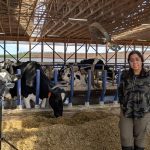Reading Time: 4 minutes Dalhousie University researchers use artificial intelligence to create new dairy farm apps that analyze cattle sounds and measure methane.

Moo translator and methane measures: There’s an app for that
Canadian farmers can access two new app-based dairy farm tools from Dalhousie University: One analyzes cattle sounds, another promises farm-specific methane measurements

Nestle quits global alliance on reducing dairy methane emissions
Food group Nestle said on Wednesday it had withdrawn from a global alliance for cutting methane emissions that aims to reduce the impact of dairy farming on global warming.

Kiwi startup promises methane vaccine for cattle
New Zealand company in running for investment in emission-reducing treatment for livestock
A New Zealand biotech startup says it has a vaccine that can dramatically lower methane emissions from livestock.

$7.9 million cattle research project aims to find rumen efficiencies
Cross-Canada project to reduce methane production will be led by UBC researcher
A pan-Canadian research project will try to understand more about how methane is generated in the rumen of beef and dairy cattle.

COMMENT: Bovaer is added to cow feed to reduce methane emissions. Does it get into milk and meat? Is it harmful for humans?
There has been an enormous amount of misinformation about the safety of 3-NOP, with some labelling milk from herds fed the additive as "Frankenmilk." Others have been concerned it could make its way to humans via beef. The bottom line is that 3-NOP is safe. Let's unpack some of the major misunderstandings.

Study indicates methane emissions from dairy farms higher than previously thought
To reach net zero by 2050, the UK must reduce greenhouse gas emissions from agriculture and methane emissions from farm livestock pose a thorny problem. Ruminants such as cattle and sheep emit methane from their digestive systems and their manure. Scientists are trying to find ways to reduce these methane emissions without wiping out large parts of […] Read more

Canadian beef and dairy groups give thumbs-up to Bovaer
Methane-reducing tool will drive opportunities, say industry reps
Reading Time: 3 minutes Glacier FarmMedia – Beef and dairy leaders are praising a new methane reduction tool recently approved for use in Canada. Bovaer is a powdered supplement that cattle feeders and dairy producers can mix with feed. The developers, Switzerland-based dsm-firmenich, claim it can reduce methane emissions in beef cattle by an average of 45 per cent, […] Read more

Atlantic ag emissions dropped slightly since 1990: report
Greenhouse gases from cattle, fuel oil dropped; nitrogen, diesel fuel emissions increased
Atlantic Canada's net agricultural emissions have fallen slightly between 1990 and 2021 as livestock numbers decreased and reliance on fuel oil declined, a new report says.

First-of-its-kind cattle methane limiter approved for Canada
Enteric methane emissions from cattle contributes 3.3 per cent of Canada’s total GHG emissions
A feed ingredient designed to reduce methane emissions in beef and dairy cattle has received market authorization in Canada.

Cattle sector awaits details on methane plan
Early thinking is that federal incentives to help producers reduce cattle emissions could fit with industry targets
Reading Time: 2 minutes Glacier FarmMedia – Canada’s draft policy that would provide financial incentives to livestock producers to reduce methane from cattle aligns with the beef sector’s target to see those emissions reduced by one-third by 2030. The beef industry will have to see how well federal government proposals merge with its own efforts, which have already resulted in Canadian […] Read more

